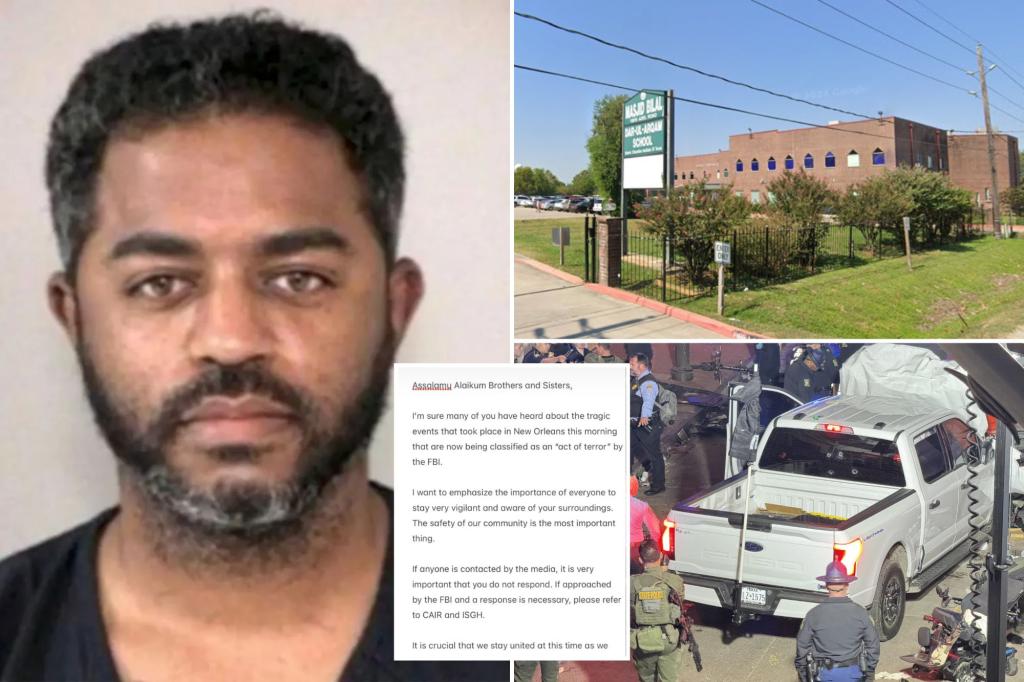The aftermath of the horrific New Orleans attack, perpetrated by Shamsud-Din Jabbar, has brought his local Houston community, particularly the Masjid Bilal mosque, into the spotlight. The mosque issued a statement advising its members against engaging with the media and directing any inquiries from the FBI to the Council on American-Islamic Relations (CAIR) and the Islamic Society of Greater Houston (ISGH). This directive underscores a complex interplay of community protection, potential legal anxieties, and the controversial nature of CAIR itself. The mosque’s emphasis on unity amidst condemnation of the “terrible acts” suggests a desire to present a unified front, possibly in anticipation of negative attention and scrutiny. Referring inquiries to CAIR, however, potentially complicates the situation given the organization’s history and current legal challenges.
The choice of CAIR as a designated point of contact for FBI inquiries raises immediate questions due to the organization’s controversial past. The White House severed ties with CAIR in the previous year following inflammatory remarks by its co-founder expressing support for Hamas attacks against Israel. This incident placed CAIR under intense scrutiny, further amplified by a defamation lawsuit filed against a former employee. The lawsuit backfired, leading to a court order requiring CAIR to disclose its financial records, raising concerns about transparency and potential sources of funding, including alleged ties to foreign governments and terrorist organizations. These factors bring into question the mosque’s decision to direct its members to an organization facing such significant controversies, suggesting a potential preference for organizational loyalty over cooperation with law enforcement agencies.
Masjid Bilal’s statement underscores a delicate balancing act within the Muslim community. On one hand, the mosque’s condemnation of Jabbar’s actions reflects an attempt to distance the community from the violence and portray Islam as a religion of peace. On the other hand, the directive to refer FBI inquiries to CAIR, a group with a contentious history, potentially undermines the message of cooperation and transparency. This approach may be interpreted as a defensive maneuver, prioritizing community protection and potentially shielding members from unwanted scrutiny. While the statement emphasizes unity, the underlying message may suggest a sense of apprehension and mistrust towards law enforcement agencies and the media.
The current circumstances surrounding CAIR, including the severed ties with the White House and the ongoing legal battles, further complicate the situation. The order to disclose its financial records raises legitimate concerns about the organization’s transparency and potential sources of funding. The mosque’s recommendation to engage CAIR, despite these controversies, creates a perception of prioritizing a specific narrative over full cooperation with authorities. This could be interpreted as an attempt to control the information flow and manage the narrative surrounding Jabbar and his connection to the community.
It’s crucial to consider the backdrop of increasing Islamophobia and the heightened scrutiny faced by Muslim communities in the wake of terrorist attacks. This context may influence Masjid Bilal’s cautious approach, aiming to protect its members from potential prejudice and discrimination. However, the chosen strategy of directing inquiries to a controversial organization could inadvertently reinforce negative perceptions and distrust. It also raises questions about the mosque’s internal decision-making processes and the potential influence of specific ideologies within the community.
The situation demands a nuanced understanding of the complex dynamics within the Muslim community and the challenges it faces. While condemning terrorism and advocating for peace are essential, the choice of partners and strategies can significantly impact public perception. Masjid Bilal’s approach, though potentially motivated by a desire to protect its members, could be counterproductive, further complicating the relationship between the community and the broader society. The focus on unity, while commendable, should not come at the expense of transparency and cooperation with law enforcement. A more open and collaborative approach might better serve the community’s long-term interests and contribute to building bridges rather than reinforcing divides.

